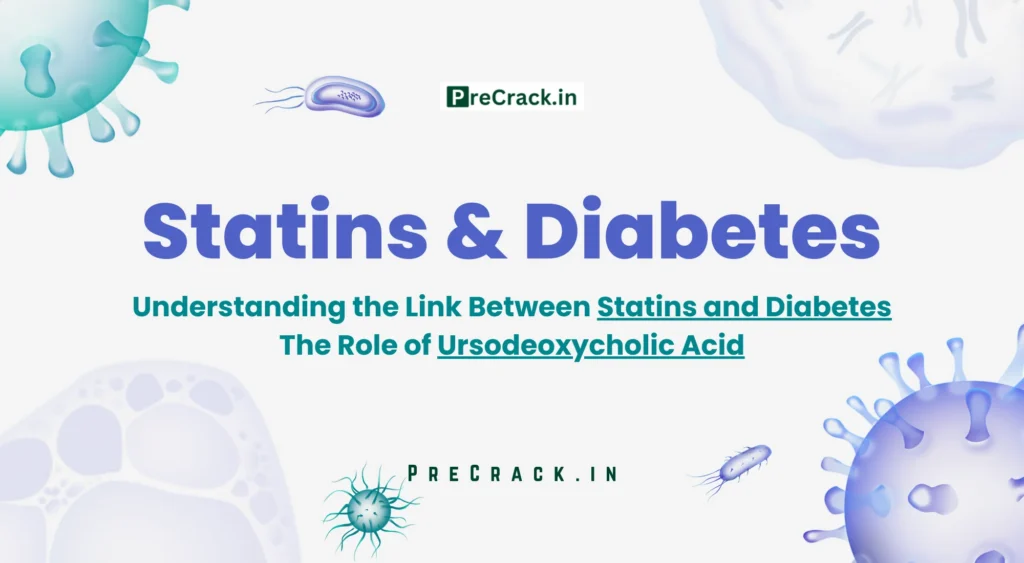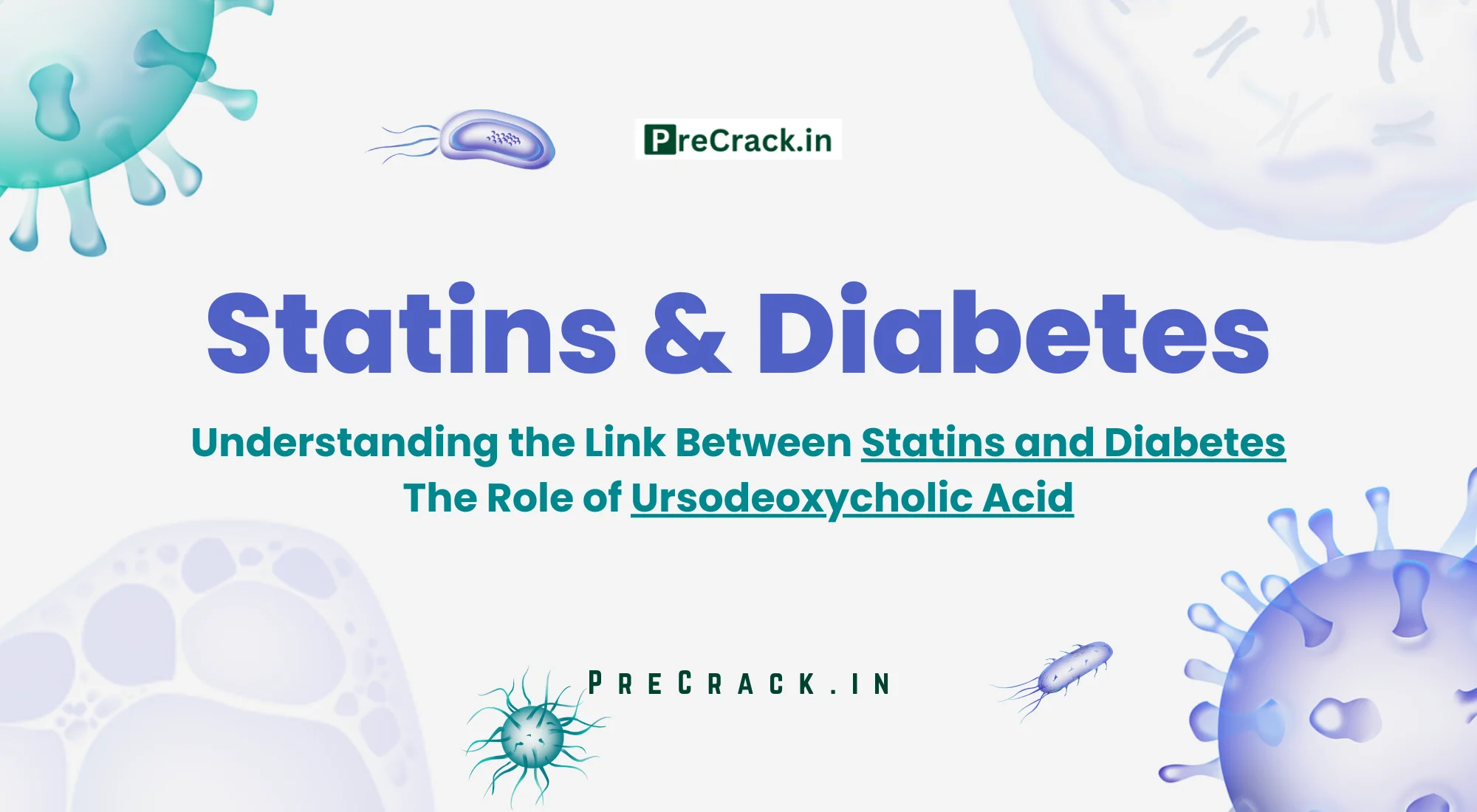Understanding the Link Between Statins and Diabetes: The Role of Ursodeoxycholic Acid
Table of Contents
Introduction to Statin and Diabetes UPSC
Welcome to PreCrack! A recent study conducted by researchers in China sheds light on the potential connection between statin use and the development of diabetes. Statins, commonly prescribed for managing cardiovascular disease, have been associated with an increased risk of glucose intolerance and diabetes in some individuals.
In this short blog, we’ll inform you with all the details about Bile Acid and Statin-induced diabetes. This blog will help you covering your UPSC CSE Science potion of the syllabus.
So, let’s start-

Read Also | What is Inflammatory Bowel Disease(IBD)?
What is the News? – UPSC Current Affairs 2024
A recent study reveals that administering ursodeoxycholic acid (UDCA) can counteract the risk of statins inducing glucose intolerance and diabetes. Statins, vital for cardiovascular health, have been associated with increased diabetes risk. The mechanism, previously unclear, involves UDCA, a bile acid. Researchers found reduced Clostridium bacteria in statin users, affecting bile acid synthesis and glucose metabolism.
Testing UDCA on participants mitigated glucose issues without hindering statin’s lipid-lowering effects. This discovery offers optimism but warrants further randomized clinical trials for validation. Statins, crucial in managing cholesterol, function by inhibiting an enzyme in LDL cholesterol production, remaining indispensable in global healthcare.
Source – The Hindu
What is Bile Acid?
Bile acids are a group of steroid acids produced by the liver and stored in the gallbladder. They aid in digestion by emulsifying fats in the small intestine, facilitating their absorption. Bile acids also play a role in the elimination of waste products, including cholesterol, from the body. They are critical for the proper digestion and absorption of dietary fats and fat-soluble vitamins.
What is Statin-Induced Diabetes? | Statins and Diabetes
Statin-induced diabetes refers to the development of diabetes or glucose intolerance in individuals who are prescribed statin medications to lower cholesterol levels. Statins are widely used to reduce the risk of cardiovascular disease by lowering LDL cholesterol levels. However, some studies have suggested that statin therapy may increase the risk of developing diabetes or worsening glucose tolerance in susceptible individuals.
Statin-induced diabetes has several components:
- Statins: These are medications prescribed to lower cholesterol levels by inhibiting the enzyme responsible for cholesterol production in the liver.
- Glucose Intolerance: Refers to a condition where the body is unable to regulate blood sugar levels effectively, leading to higher than normal blood glucose levels.
- Diabetes: A chronic condition characterized by elevated blood sugar levels due to either insufficient insulin production or ineffective use of insulin by the body.
- Cardiovascular Disease: Refers to conditions affecting the heart and blood vessels, including heart attacks, strokes, and peripheral artery disease.
- Metabolic Dysfunction: Statins may interfere with metabolic processes, potentially leading to disruptions in glucose metabolism and insulin sensitivity.
- Risk Management: Despite the potential risk of statin-induced diabetes, the benefits of statin therapy in reducing cardiovascular events often outweigh the risks, especially in individuals at high risk for heart disease.
What is Frank Diabetes?
The “Frank diabetes” refers to the clinical manifestation of diabetes mellitus, a chronic condition characterized by elevated blood sugar levels. In the context of statin therapy, “frank diabetes” describes cases where individuals develop clinically significant diabetes as a result of taking statin medications, particularly when there is a clear onset of symptoms and diagnostic criteria for diabetes are met.
How Gut Microbiome Related to it?
The gut microbiome plays a crucial role in various aspects of human health, including metabolism and immune function. Research suggests that alterations in the composition and diversity of gut bacteria, such as a decrease in Clostridium-rich microbiota, can impact bile acid metabolism and glucose metabolism.
These changes may contribute to the development of glucose intolerance and diabetes in individuals taking statins.
The Problem with Statins
While statins are widely recognized for their effectiveness in lowering LDL cholesterol levels, concerns have arisen regarding their potential to induce glucose intolerance and diabetes. Despite the known risks, statins remain a cornerstone of cardiovascular disease management due to their significant benefits.
Understanding the Mechanism
The study published in Cell Metabolism provides insights into how statins may disrupt glucose metabolism. By analyzing the gut microbiome of individuals taking atorvastatin, researchers observed a reduction in certain bacteria and alterations in bile acid profiles. This disturbance in the gut microbiome could contribute to impaired glucose metabolism.
The Role of Ursodeoxycholic Acid (UDCA)
Researchers investigated the potential of UDCA in counteracting the adverse effects of statins on glucose homeostasis.
- Glucose Intolerance Mitigation: UDCA counteracts statin-induced glucose intolerance, crucial for diabetic risk management.
- Bile Acid Modulation: It influences bile acid metabolism, impacting the gut microbiome and glucose homeostasis.
- Clinical Trials: UDCA’s efficacy is evident in clinical trials, where it significantly reduces HbA1C levels.
- Metabolic Health Support: By restoring impaired glucose homeostasis, UDCA enhances metabolic health without compromising lipid-lowering effects.
- Future Implications: Further research and randomized clinical trials are needed to validate UDCA’s therapeutic potential comprehensively.
Implications and Future Directions
The findings of this study offer hope for individuals taking statins, as UDCA demonstrates potential in mitigating the risk of diabetes associated with statin use. However, further research, including randomized clinical trials, is needed to validate these findings and establish UDCA as a viable therapeutic option.




One thought on “What is the Link Between Statins and Diabetes: Top 5 Role of Ursodeoxycholic Acid – Best Analysis”
Comments are closed.